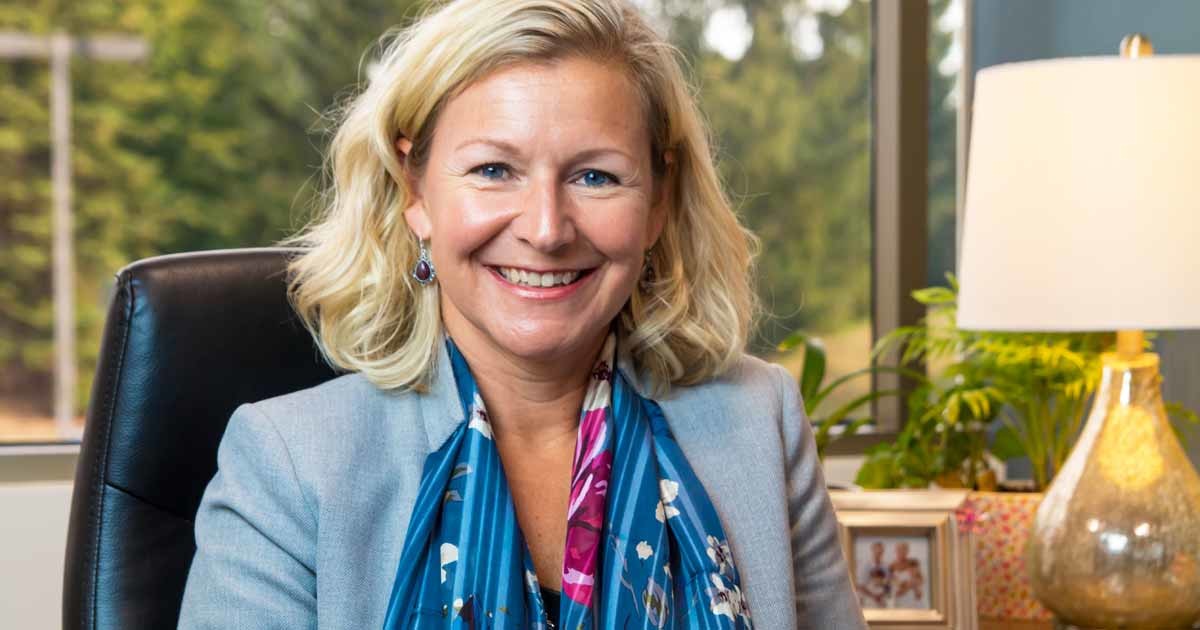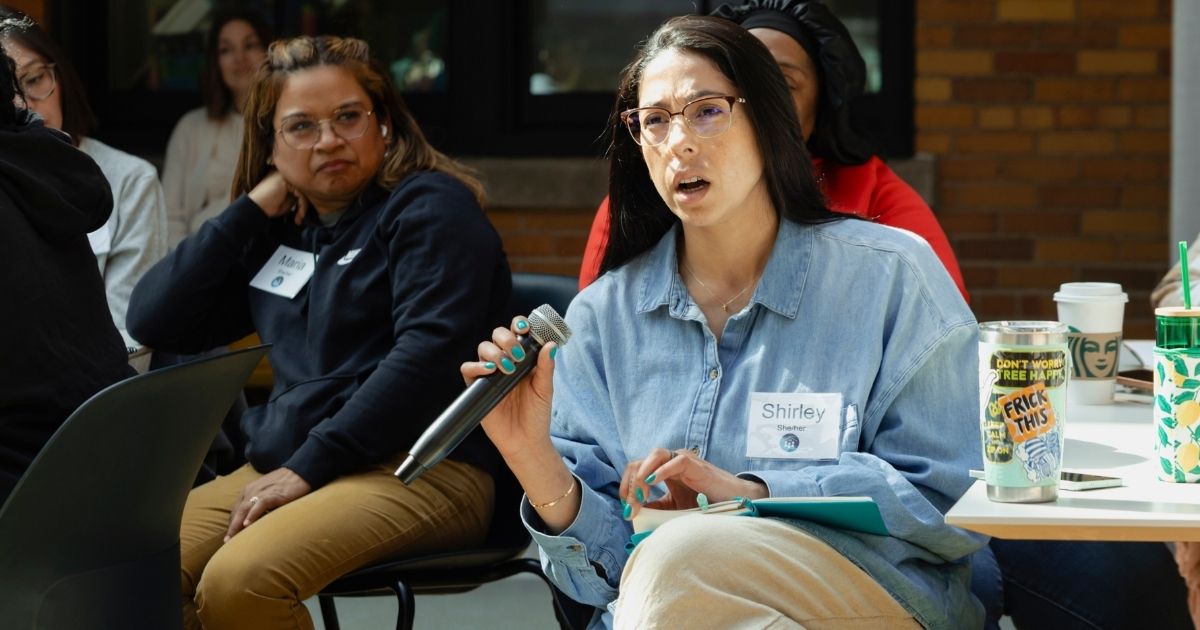Jennifer Jurgens, president of Grand Rapids-based software maker SalesPad, believes women are critical for the future of technology.
"I am playing around with the idea of 'high tech and high touch,'" Jurgens said. "I think that's the future of technology. I think that's why women are so well suited for this industry. Technology is not cold—it's not a dark room, punching buttons—it's people skills."
Yet when it comes to statistics and stereotypes of women in technology, the future isn't looking particularly bright. The National Center for Women & Information Technology reported that while more than half of all professional occupations in the United States workforce were held by women in 2017, only 26 percent of professional computing occupations were held by women—and computing is just one piece of the puzzle.
Jurgens talks about her own career path in technology, the stereotypes that may discourage women from exploring the field, and why women are critical players for the future.
WMW: Could you share a bit about your education and background, and what brought you to SalesPad?
JJ: A lot of my background jobs, if you go in and look at my LinkedIn profile, they may seem a little disjointed. I have an undergraduate degree from Michigan State University in supply chain management. From there, I went to Hawaii and managed a military bar, where I wrote inventory systems. I've worked in trucking. I've worked in technology—everything from data product lines to working on e-commerce startup for a little company called Intel and SAP.
Every single one of those jobs ... They all have a common thread or theme. I like to make things work better. I like to make things more efficient, faster. I typically rely on technology in some way, shape or form to help me get there.
In looking back, we have that luxury of trying to find a pattern. Mine has always been organization—and not just technology, but people and softer skills. It all makes a ton of sense in that way.
Right up until I did this gigantic shift and went to work for a nonprofit.
I was diagnosed with breast cancer when I was 37 and had lost my mom to breast cancer when I was 12. In that point in my career, I decided it was time for me to give back in some way, to try to use my skills to help a cause. What isn't surprising is that when I got there, I organized. I took three affiliates with overlapping, duplicative operations and streamlined them and made them into one. Along the way, I learned a whole lot about women's health, government, insurance and, mostly, people.
That brings us to the present.
WMW: Why SalesPad?
JJ: It's where I came from. Salespad is a really interesting combination for me because we are a software development company, but the software we're developing is around operational enterprise resource planning (ERP), which is a strong part of the overall supply chain. It's my degree; the software that we build helps other companies be more efficient in their internal processes.
It has, at its core, what I love to do: make things better and more efficient for people.
I never go into a project saying what you're doing is bad. I go into a project, look around and ask, "Is there a way we could tweak this to make it better?" That's the culture here. This is a group of problem-solvers who want to help people—and we've got some great software and products to do that.
WMW: What are the misconceptions surrounding women in technology?
JJ: First and foremost, I want people to open their minds that working for a technology company doesn't mean that you're a coder. We do have female developers. Absolutely. But the quality assurance, the testing, the design elements, implementation, support, project management, marketing—these are all opportunities in tech that aren't the stereotype.
WMW: Did you ever think you would end up in technology?
JJ: My senior year at Michigan State, when the internet was just rolling out, we were doing this big group project writing a business case for—you're going to laugh—pagers.
No one wanted to go in the computer lab and create the spreadsheets or do the graphics for our project. So I said, "All right, I'll do it." I stumbled in there and figured it out. I was hooked. Even in moving to Hawaii shortly thereafter, one of the things I established was inventory management for nightclubs in Waikiki using Excel Macros. It was a direct relation to that memory. I know how to do this faster. I know how to get this done better. It does not mean I can help my husband figure out his laptop at home.
WMW: What challenges do you face as a woman in the technology field?
JJ: I tend to look at the advantages of being different. Because there are so few women still in this field, there aren't many of us at the table. Because of that, I'm different. I'm memorable right away. I just have to sit, wait, listen. When I go to say something, it's typically heard and remembered. I think that speaks to diversity in general. When we're different, we stand out—and that can be an advantage.
WMW: Why do we need more women in technology?
JJ: Diversity and differences, in general, are going to be even more important in the next century. What we're seeing right now is this rapid development of technology—automation, artificial intelligence, robotics. The skillset needed for the future is empathy—listening, people skills, understanding.
We have to understand who people are and what makes them tick. If we don't have the relationship and the understanding of what people really need, we won't make the right technology products.
I'll go on the record and say it: I think women are generally better at that in the first place. If you want to stereotype, what are we known for? Empathy. Listening. Understanding.
WMW: You mentioned you learned a lot about people in the nonprofit field. What did you learn?
JJ: I learned that the logical answer isn't always the right solution. The logical answer isn't going to make everybody feel better always. The really hard work is in the relationships. I think the same is important when we talk about leadership and companies and the people we work with and for every day. I guess I just learned that the relationship—the people you work with and the people you work for—is more important sometimes than the product.
WMW: What are your top three tips for women who want to build a career in technology?
JJ: First, just do it. Jump in. I think women tend to underestimate their abilities and maybe overinvest in research and feeling like they need to be an expert before they go and do. I'm looking for people who are lifelong learners, who come in with an open mindset and want to learn. Don't think you're not technical.
Second, pick a language. You can learn it online. There are so many courses and things you can do. Just try to get the core understanding of any topic, any piece, any bit of software. Mine started in the world of big databases and inventory management—that knowledge translates to different technologies all the time.
Finally, network. When you know somebody has your back, you're more likely to take a leap. Women in technology should all have each other's backs. Networking with likeminded women who've got your back is absolutely key. If you haven't experienced something before, it's likely that somebody in that group has.
The thing is, 99 percent of the time, we don't need their help—it's knowing that it's there if we did that empowers us to take on that next challenge.
WMW: Technology changes rapidly. How do you stay up to date on that?
JJ: The first part is: Acknowledge that you'll never know everything.
The second part is: It's OK to say "I don't know."
The third part is: I am, at heart, a lifelong learner. I am constantly reading, listening, attending. I think lifelong learning is going to be the key for anyone in this industry because of that rapid evolution.
By Cassie Westrate, staff writer for West Michigan Woman.




